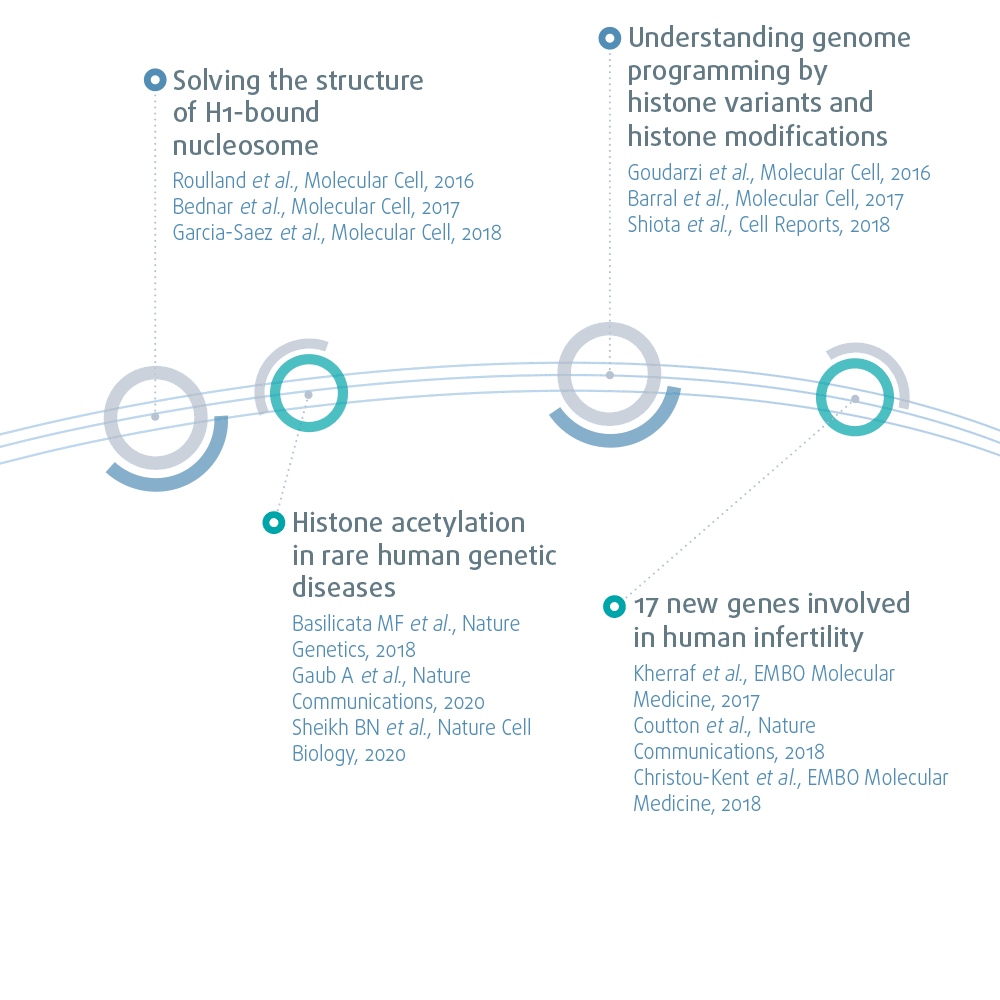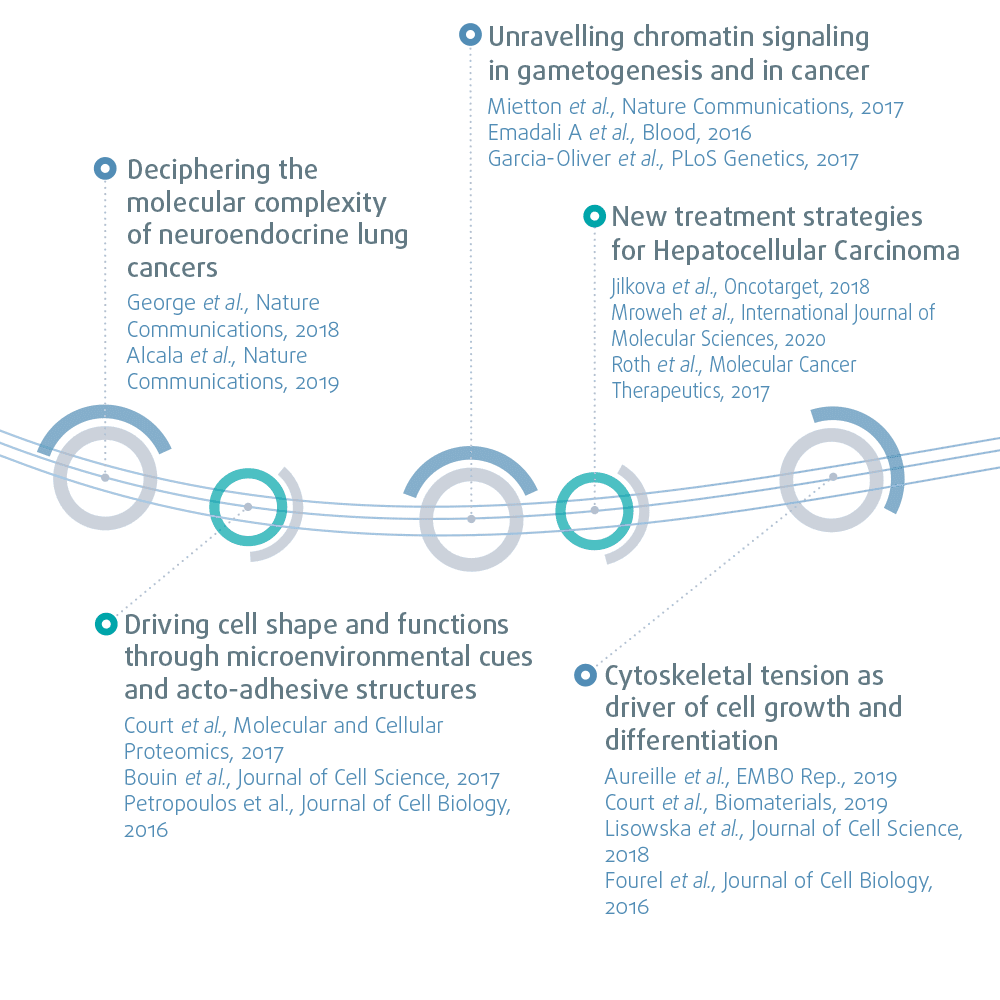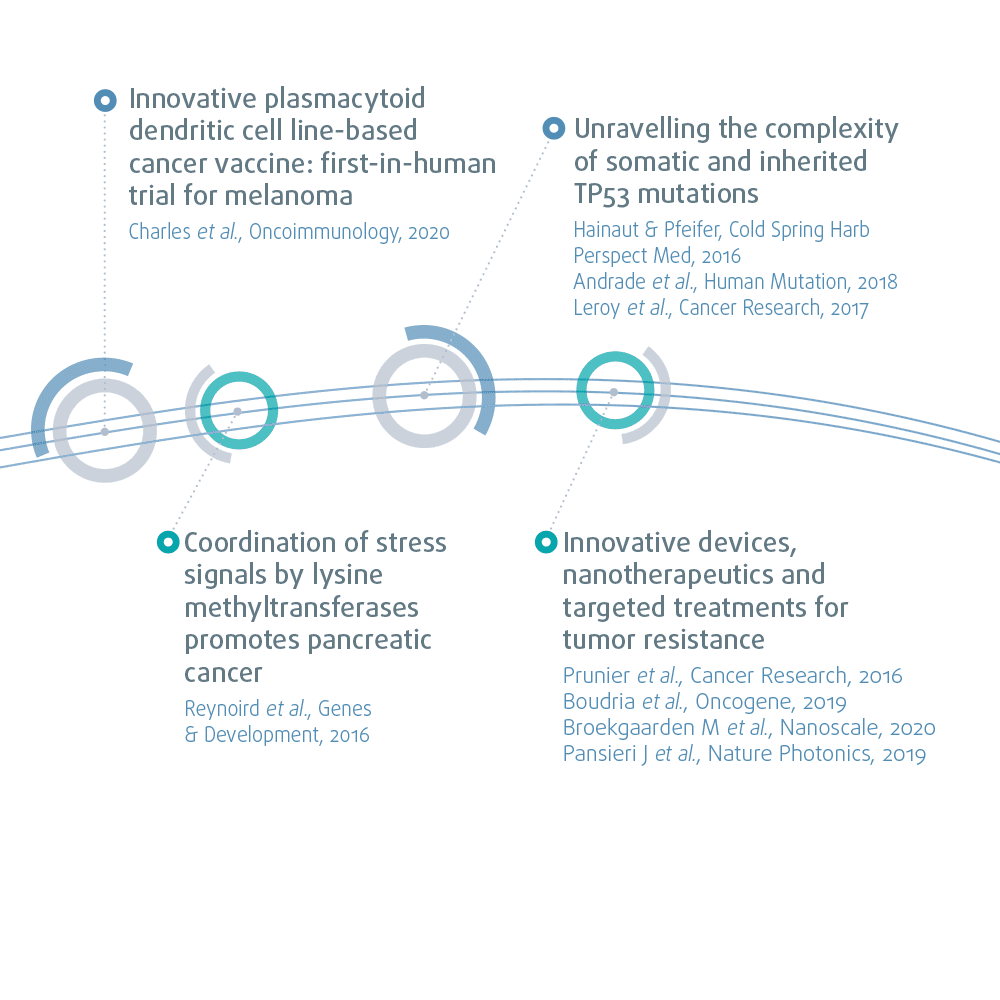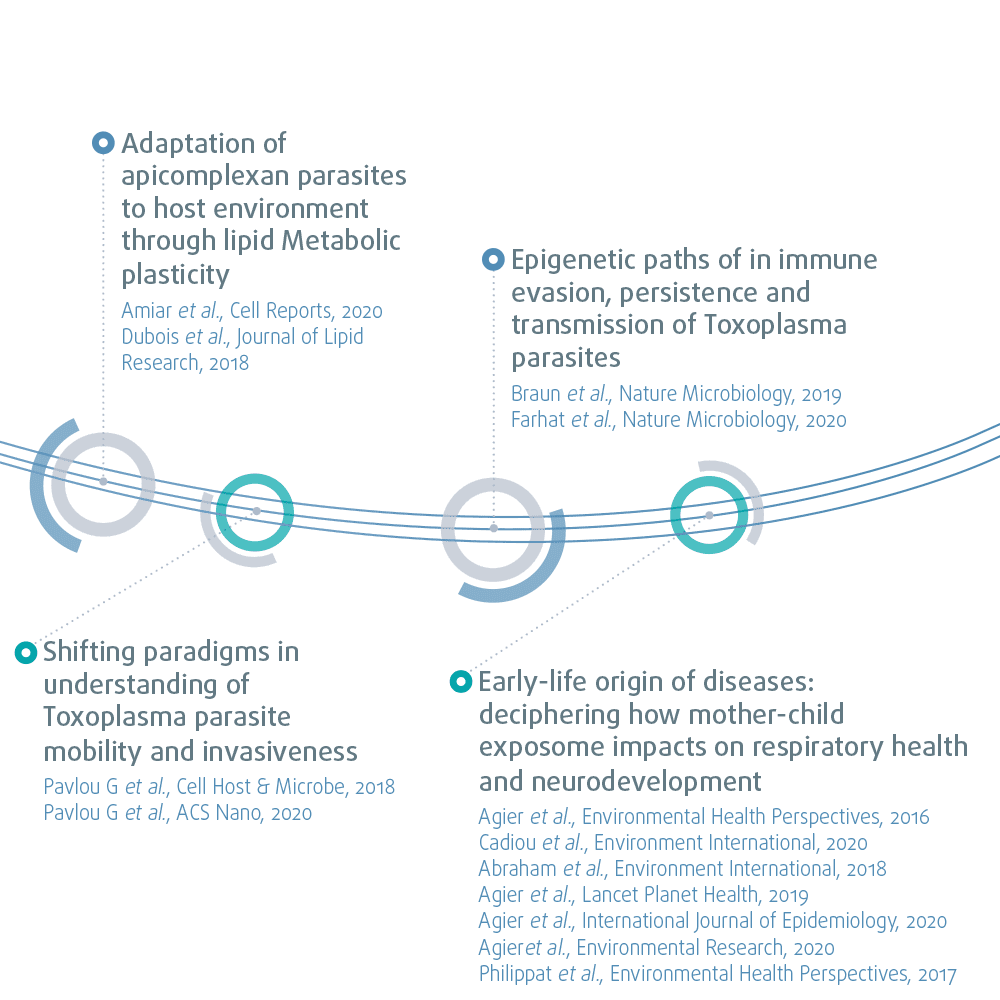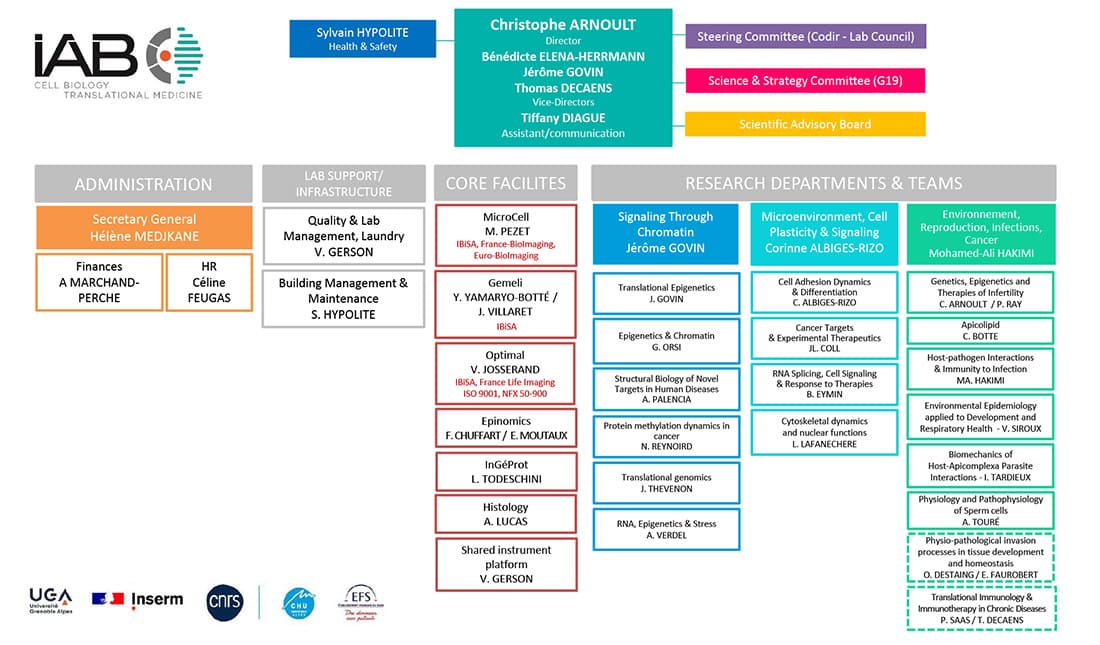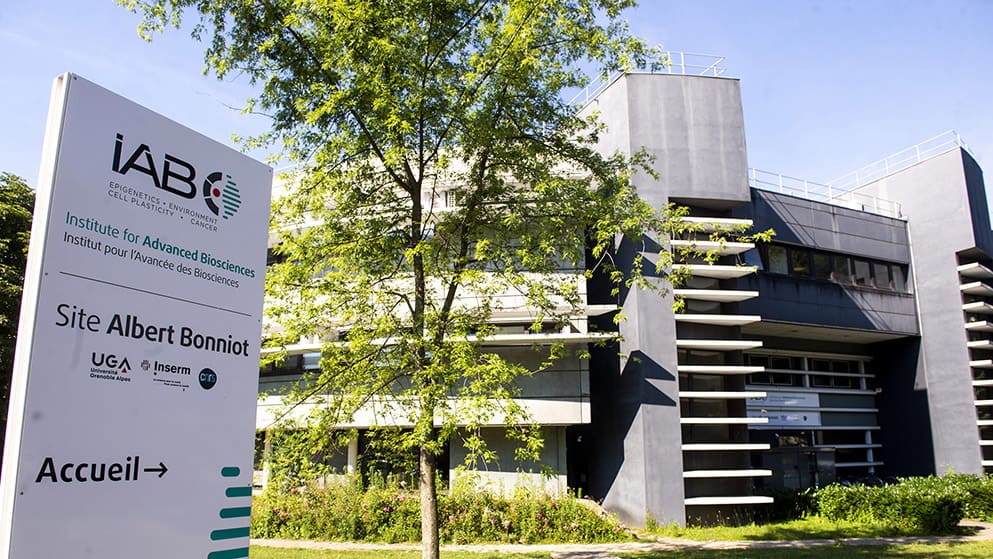
The institute
Who we are
IAB is an internationally renowned research center in basic and translational biomedical research hosting 18 multidisciplinary research teams and groups (350 staff)The goal shared by IAB scientists is Understanding how environment shapes biological systems – that is, the basic mechanisms by which the epigenome, cell and tissue plasticity reprogram themselves under the influence of their chemical, metabolic, physical, cellular, microbiotic and immunological environments.
The goal shared by all IAB teams is to improve human health by better understanding how the environment at all scales from molecules to population, shapes the development and fate of biological systems. To achieve this, IAB develops a scientific strategy based on a unique combination of scientific expertise spanning the entire biological continuum, from molecules to populations. This approach generates both fundamental and translational advances applied to four major global challenges for human health:
- Cancer prevention, early detection and experimental therapy
- Genetics, epigenetics, physiology and therapies of infertility
- Host-pathogen interactions, metabolism and immunity to parasitic infection
- Exposome of early life exposures in relation with development and respiratory health.
How we are structured
IAB is organized into 3 research departments, supported by 7 core facilities (platforms, service) and one support team (finances, administration, logistics, infrastructure).

Our values
IAB is an open scientific and medical community committed to excellence by promoting a culture of intense and dynamic collaboration and encouraging risk-taking geared towards value creation in multiple forms: generation of breakthrough knowledge (publications, patents, technologies), creation of start-ups and R&D ventures, improved health care and medical practice, public policies (prevention, environment) and patient empowerment (information, support to patient expertise, involvement int research).
IAB is an equal opportunity work community that welcomes students at any levels as well as scientists of all origins. It offers mentoring and career development support as well as access national and international training and education program. IAB is committed to professional equality, ethics and scientific integrity, participative management and collective decision-making, training, health and safety, prevention of harassment, quality of life at work and ecological transition.
IAB strictly applies international authorship rules on all its publication, according to the recommendations of the International Committee of Medical Journal Editors (ICMJE) [https://www.icmje.org/recommendations/].
All IAB staff members, as well as duly registered IAB students, trainees and visitors, can be authors of publications, provided they meet the authorship criteria of ICMJE.
The official format for authorship’s signature at IAB is:
[Author Name (first, family)] University Grenoble Alpes, Inserm U 1209, CNRS UMR 5309, [Team name], Institute for Advanced Biosciences, 38000 Grenoble, France]
Psycho-social risks encompass risks to the mental, physical and social health of staff members, induced by employment conditions and organizational and relational factors. They can manifest themselves in various forms: stress at work, but also feelings of unease, isolation or suffering at work, incivility, physical or verbal aggression, violence, etc. IAB is fully committed to improving the Quality of Life at Work (QWL). Since 2017, at the instigation of Management, a group comprising volunteer members representing administrative, technical and research staff has been set up. The QWL group takes into account the concerns and difficulties related to the quality of life at work of the members of the unit, in order to identify areas for improvement and to propose actions on the most sensitive points. It can also be called upon in the context of individual conflict situations, malaise or harassment. The members of the group have received training in active listening, which enables them to assist and guide agents in certain situations, in complete neutrality and strict confidentiality. The group acts as a relay point and facilitates the referral of agents to the most appropriate supervisory resource persons and services. The group also participates in setting up times of cohesion within the institute. A generic e-mail address (iab-qvt@univ-grenoble-alpes.fr) allows the QWL group to be contacted, if necessary.
Major scientific contributions
Key numbers
18
Teams
350
people
30
nationalities
114
researchers and teachers
52
PhD students
39
certificats
7
technical platforms
6
M€ subsidy / year
History
From the Albert Bonniot Institute
to the Institute for Advanced Biosciences
The roots of IAB go back the late 1980’s when the Faculty of Medicine of University Joseph Fourier in Grenoble initiated plans to create a research institute dedicated to biomedical research located next to the main University Hospital building. In 1994, a new building designed by the architect studio Ludmer-Bouvier was established and dedicated to Professor Albert Bonniot (1890-1965) the founder of the modern Faculty of Medicine in Grenoble. Indeed, Bonniot, a thoracic surgeon who pioneered the development of lung cancer surgery, had formulated a vision that still resonates today:
I have devoted all these last years to striving to create in my adopted city a center of work where students can be better educated, where my colleagues and successors are better equipped than I was myself. If their work benefits, I will not regret the time I spent there at the expense of my personal work.
In 1996, IAB was established under the name “Institut Albert Bonniot”, with Jean-Jacques Lawrence as its director. This first version of the IAB had a scientific strategy focused on Development and Cancer. In 2016, IAB was re-created under the name “Institute for Advanced Biosciences”, expanded to 19 teams and including new research areas such as parasitic infections and infertility. The current structure is established for the period 2021-2026 as part of “A wave” of the National research evaluation program (HCERES Vague A).
Key dates of the Albert Bonniot Institute (IAB)
Official inauguration of the IAB under the direction of Jean-Jacques Lawrence. The IAB was then a Federative Research Institute (IFR) bringing together four research structures:
- an INSERM unit directed by Jean-Jacques Lawrence,
- a CNRS joint research unit (UMR) headed by Marc Block,
- a CNRS joint research unit (UMR) headed by Jacques Demongeot,
- two INSERM joint teams (EMI) headed respectively by Dominique Leroux and Christian Brambilla.
Marc Block succeeds Jean-Jacques Lawrence as director of the IFR-IAB. The institute then brings together five research structures:
- an INSERM unit headed by Saadi Khochbin,
- an INSERM unit headed by Christian Brambilla,
- a CNRS UMR headed by Marc Block,
- a CNRS UMR headed by Jacques Demongeot,
- an INSERM Joint Team (EMI) headed by Dominique Leroux.
The IFR-IAB becomes an INSERM Integrated Research Center (CRI) under the direction of Christian Brambilla (INSERM U823, in joint supervision with the University of Grenoble Alpes).
Pierre Hainaut is appointed director of the INSERM-UGA Unit. At the instigation of the Unit's CNRS members, the CNRS also joins the Unit's supervisory bodies.
Saadi Khochbin takes over as interim director of the Unit.
Pierre Hainaut resumes leadership of the IAB.
Christophe Arnoult is appointed director of the IAB.
IAB governing institutions and evaluation mechanisms
IAB is a joint research center of University Grenoble Alpes (UGA, www.univ-grenoble-alpes.fr), National Institute of Health and Medical Research (Inserm Unit 1209, www.inserm.fr) and National Center for Scientific Research (UMR CNRS 5309, www.cnrs.fr).
IAB has established partnerships with Grenoble Alpes University Hospital (CHUGA, www.chu-grenoble.fr) and the French Blood Establishment (EFS, www.dondusang.net).
The scientific program of IAB is evaluated on a quinquennial basis by the High Council for Evaluation of Research and Higher Education (Hcéres), the National organization in charge of independent evaluation of research ( ).
The last evaluation took place in 2020. The final evaluation report is available at: https://www.hceres.fr/fr/rechercher-une-publication/iab-institut-pour-lavancee-des-biosciences
The next evaluation will take place in 2026.
In the development of its program, IAB is assisted by an expert Scientific Advisory Board. The missions of the SAB are to provide advice to IAB direction on scientific strategies and opportunities, to contribute expert views in the creation of new groups and teams and to review the scientific program proposed by IAB teams ahead of its presentation at Hcéres.
The current co-chairs of the IAB SAB are Ms. Catherine Jessus, Research Director at CNRS (Sorbonne University, Paris, France) and Mr. Jean-Emmanuel Sarry, Research Director at INSERM (Toulouse Cancer Research Center, Toulouse, France)
To prepare for the 2026 HCÉRES assessment, the IAB SAB met from January 22 to 24, 2025 and was composed of:
- Catherine Jessus, Co-president Institute of Biology Paris-Seine, Sorbonne University (IBPS) - Paris, France
- Jean-Emmanuel Sarry, Co-president Cancer Research Center of Toulouse (CRCT) - Toulouse, France
- Cogné Michel MicrOenvironment and B-cell: Immunopathology cell DIfferentiation and Cancer (Mobidic) - Rennes, France
- Figueiredo Luisa Miranda Gulbenkian Institute for Molecular Medicine - Lisbon, Portugal
- Heindryckx Björn Department for Reproductive Medicine, Ghent University Hospital - Ghent, Belgium
- Paris François Nantes-Angers Cancer and Immunology Research Center (CRCI2NA) - Nantes, France
- Raemdonck Koen Lab of General Biochemistry and Physical Pharmacy, Ghent University - Ghent, Belgium
- Rancière Fanny Centre de Recherche en Epidémiologie et Statistiques (CRESS), University Paris Cité - Paris, France
- Reymond Alexandre Health 2030 Genome Center, Fondation Campus Biotech - Geneva, Switzerland
- Trouche Didier Centre de Biologie Intégrative (CBI), University Paul Sabatier - Toulouse, France
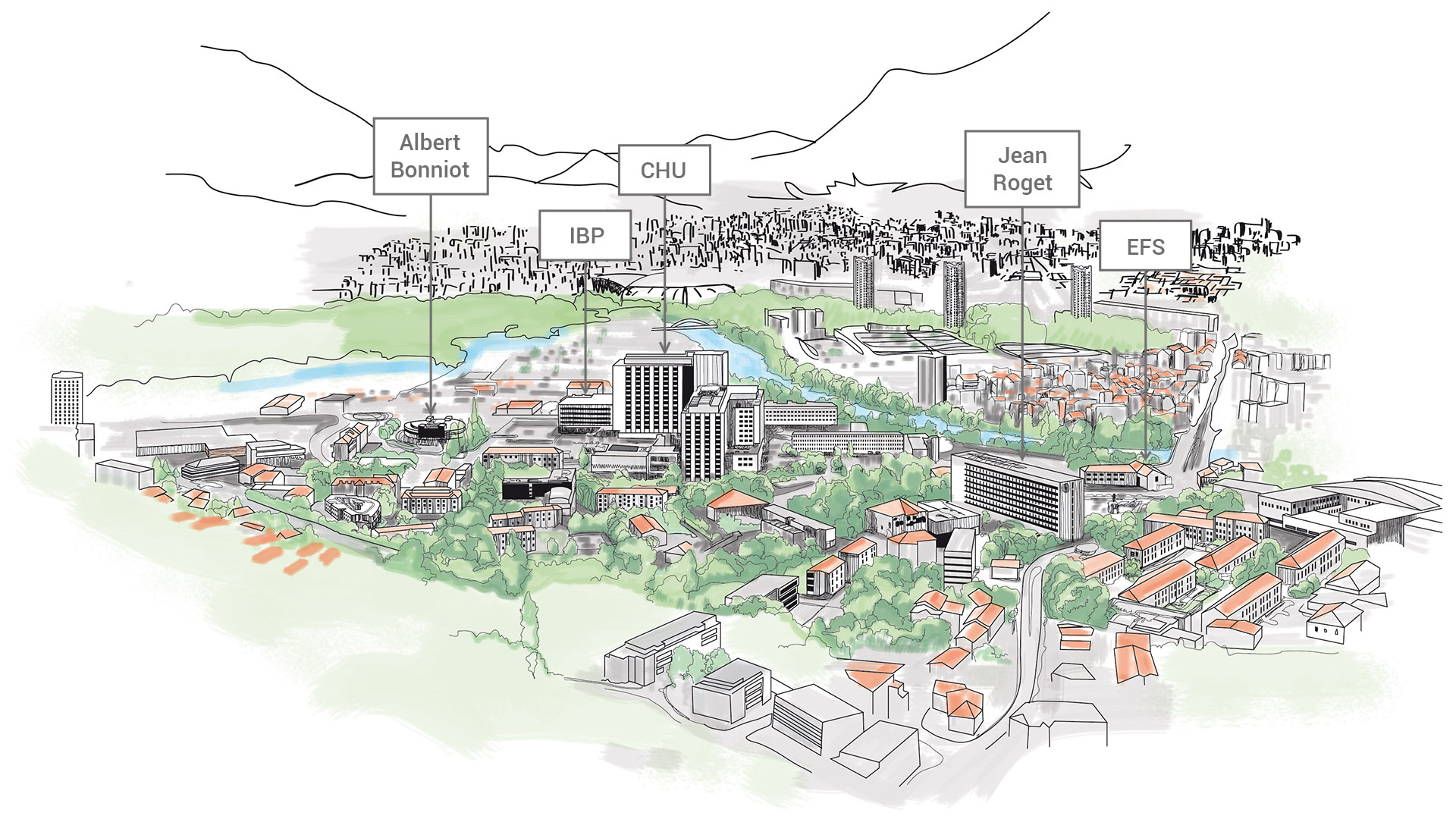
IAB Sites and location
IAB is established in various sites and building in the immediate proximity of Grenoble Alpes University Hospital (CHUGA). The main IAB locations are:
- Albert Bonniot Building (address: Institut pour l'Avancée des Biosciences (IAB), Site Santé - Allée des Alpes, 38700 La Tronche)
- Jean Roget Building (address: Faculté de Médecine et Pharmacie, 38700 La Tronche)
In addition, a joint IAB-EFS research group is hosted at EFS building (address: 29 Av. des Maquis du Grésivaudan, 38700 La Tronche) and several IAB scientists have their permanent offices within the premises of CHUGA. A group affiliated to the RNA, Epigenetics & Stress team (team leader André Verdel) is located in Savoie.
IAB Governance
- The director of IAB is Christophe Arnoult.
- The deputy directors are Bénédicte Elena-Herrmann, Jérôme Govin and Thomas Decaens.
- The director of Administrative Services and Human Resources is Hélène Medjkane.
The scientific life and program of IAB is based on its 16 research teams and 2 emerging groups. Teams are created at the beginning of each quinquennial program on the basis of Hcéres review and are endorsed by UGA, Inserm and CNRS. Groups are created during the quinquennial program to facilitate the emergence of new projects and leaders. They are not endorsed as such by UGA, Inserm or CNRS.
Each team assumes responsibility for its own projects and programs within the general scope of IAB scientific strategy and leverages its own funding through competitive grant applications.
Teams are grouped in 3 thematic departments:
- Signaling and Chromatin, headed by Jérôme Govin
- Microenvironment, Cell Plasticity and Signaling, headed by Corinne Albigès Rizo
- Environment, Reproduction, Infections, Cancer, headed by Ali Hakimi
Departments develop their own thematic research and scientific animation programs, at the initiative of their members.
IAB also includes 6 platforms (shared technical resources) as well as teams dedicated to administration, human resources and finances as well as to logistics, maintenance and infrastructure.
Board of Directors
The heart of collective decision making at IAB is the Board of Directors (CoDir). The CoDir includes team leaders, platform managers and elected representatives of all categories of personnel: researchers, professors, engineers, technicians and administrative staff, post-doctoral fellows and students. The CoDir deals with everything that concerns the common life of the IAB: common services, training, seminars, career guidance, choice of new equipment, recruitment and use of common resources. The CoDir issue votes on all statutory matters including common budget and infrastructure allocation and usage, priority requests for new posts and equipment, tenure of permanent staff. The CoDir formally meets every 2 months.
G19
G19 is a scientific and strategic body that regroups all team and group leaders. G19 shares and discusses ideas, strategies, priorities and opportunities but does not make formal decision on behalf of the Institute as a whole. G19 meets every months.
Health and Safety Committee
Working groups
IAB promotes a culture of participation through the development of multiple working groups. Each working group has a specific purpose and reports to the director and to the CoDir. Participation to working group is open to all permanent or temporary staff as well as long-term students and visitors (> 6 months). Currently active working groups include:
- Biotech Committee
- Budget
- Web
- Sustainable development - IAB GREEN
- Equal opportunities – GrouPER
- Microcell Users Group
- IAB PhD Students Committee
- Quality of life at work - QWL
- Scientific animation - Mardis de l’IAB
- Space/Buildings
Support team
The IAB support services provide administrative and technical support to all researchers so that they can carry out their research programs in the best possible conditions and environment. Composed of about twenty agents placed under the responsibility of the Director, the Deputy Director and the Administrative and Financial Director, the IAB support services work in close collaboration with the counterpart services of the IAB’s supervisory institutions, in particular the services of the Auvergne Rhône-Alpes Regional Delegation of Inserm, the Alps Delegation of the CNRS and the Central Services of the Universityof Grenoble Alps (host institution).
Within the support services, the administration, financial management and human resources (HR) team is responsible for managing the human and financial resources of the Centre, the teams and the platforms and expertise centers, as well as monitoring all the administrative procedures accompanying the IAB’s general activity.
The technical support team oversees all activities related to the maintenance and technical monitoring of the building, its safety and that of the staff occupying it, and the effective implementation of a continuous improvement approach to all processes.
It provides essential services to the IAB community: the supply of intelligent freezers which allow the teams to be supplied with current and immediately available laboratory consumables, the laundry which ensures, among other things, the washing and sterilization of laboratory dishes, the technical service which monitors the premises and intervenes on an ad hoc basis for first-level maintenance on certain equipment, the management of fluids and the logistical monitoring of all the parcels within the Albert Bonniot site.
Grenoble, a unique innovation and quality of life ecosystem
Grenoble (population: 158 000), a city in the Rhône-Alpes region of southeastern France, lies at the foot of the mountains between the rivers Drac and Isère. Surrounded by mountains, it is the ideal place for nature lovers, hikers, winter and summer sports. Its immediate surroundings include several of the most popular ski resorts in the Alps. It is also a place for arts and culture, as well as a wonderful place for family life: housing opportunities in a beautiful environment, excellent schools, public and medical services, excellent public transport systems. Located within 1hr of Lyon and Geneva, the city is easily accessible by air (Lyon St Exupery airport, 45 min) and is connected to the French rapid train (TGV) network (Paris: 3hrs).
Grenoble is an international center of excellence for Research & Development, recognized by Forbes as the 5th most innovative city in the world in 2013. With 80,000 R&D jobs (7.1% of the population ranking n° 1 in France), the scientific community of Grenoble offers the attractions of an exceptionally dense research platform, with unique support for investment and business development, in an exceptional environment at the foot of the French Alps.
In addition to many first-class research organizations such as EMBL, CNRS, Inserm, INRIA, CEA or Irstea, Grenoble hosts Minalogic, an international high-tech center on digital and nano technologies, as well as R&D centers of industrial leaders such as STMicroelectronics, Schneider Electric, Electricité de France (EDF), Caterpillar, HP, BD, Capgemini/ Sogeti, Soitec, Tecumseh Europe or Alstom Hydro France/ Italy.
For a more detailed description of Grenoble ecosystem, read “12 reasons for investing in Grenoble”
